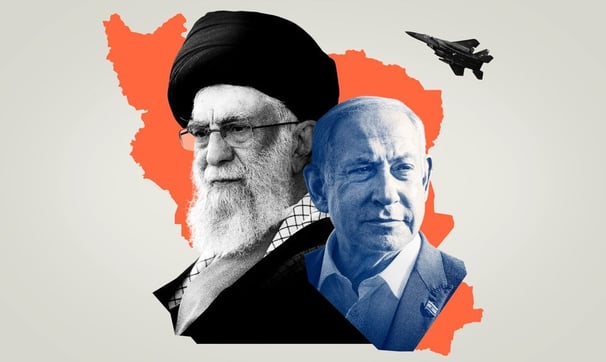How Iran-Israel Conflict affect in the Indian stock Market
WORLD MARKETINDIAN MARKET


The Iran-Israel conflict, depending on its intensity and duration, can significantly affect the Indian stock market due to the following key economic and geopolitical links:
🔥 Key Transmission Channels to Indian Markets
1. Crude Oil Prices Surge
India imports ~85% of its oil. Any Middle East tension usually leads to higher crude oil prices.
If Brent crosses $90–100 per barrel due to conflict escalation:
Inflation rises (transport, FMCG, aviation costs go up)
Rupee weakens
Trade deficit widens
🔻 Negative for: OMCs (IOC, BPCL, HPCL), paint companies (Asian Paints), aviation (IndiGo), auto (Maruti), logistics
🔼 Positive for: Upstream oil (ONGC, Oil India)
2. Rupee Depreciation Risk
Flight to safety means FII outflows, leading to pressure on the INR.
Weaker rupee makes imports costlier, adds to inflation concerns.
🔻 Negative for: Import-heavy sectors (Auto, Pharma with raw materials from China)
3. Global Risk-Off Sentiment
Conflict leads to global market volatility. FIIs may pull out capital from emerging markets, including India.
NIFTY, SENSEX may see correction, especially in high-beta sectors.
🔻 Negative for: Banks, NBFCs, real estate, midcaps
🔼 Positive for: Defensive sectors (FMCG, Pharma, IT – especially with USD revenue)
4. Gold & Safe Havens Rise
Gold prices typically surge, becoming a hedge against geopolitical risk.
🔼 Positive for: Gold ETFs, jewelry exporters (Titan, Kalyan)
5. Shipping & Supply Chain Disruptions
If Strait of Hormuz is affected, global shipping routes get blocked.
Could hurt India’s export-import trade, especially chemicals, oil & gas.
🔻 Negative for: Export-heavy industries, shipping/logistics, chemical sectors
🧭 Likely Market Reactions (Depending on Escalation)
ScenarioNIFTY ReactionOil PriceRupeeSectors HitMinor flare-up-1% to -2%Slight spikeStableEnergyAirstrike/short war-3% to -5%Brent $90–95₹84–85/USDBanks, Auto, OMCsFull-scale regional war-10%+Brent $100+₹86+All risk assets, big FII outflows
📈 What Investors Should Watch
US & China’s diplomatic stance
Brent crude trend
INR/USD levels
FII/DII activity
India’s inflation and RBI response
🛡️ Investor Strategy
Short-term traders: Stay cautious; hedge positions; avoid high-beta stocks.
Long-term investors: Focus on quality; buy defensives (IT, FMCG, Pharma) during dips.
Gold ETFs or sovereign gold bonds: Safe haven allocation.
Oil hedging via energy sector ETFs or stocks.
